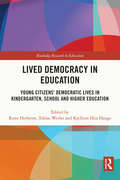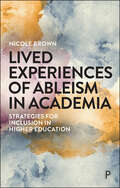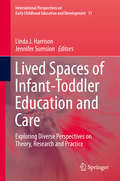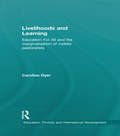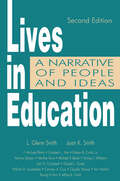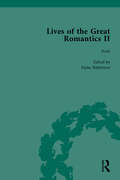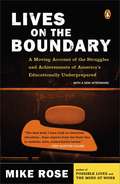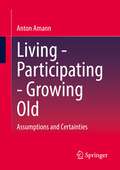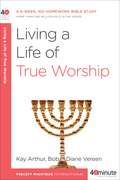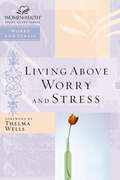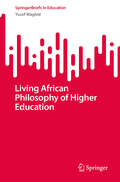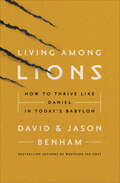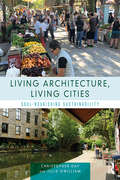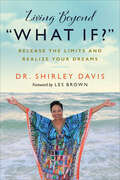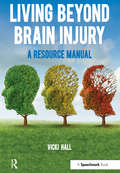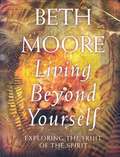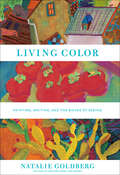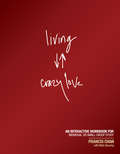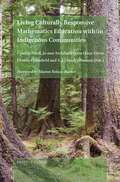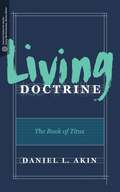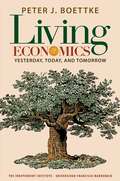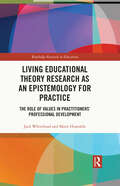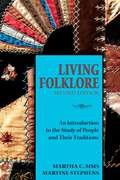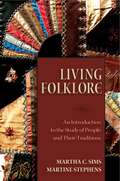- Table View
- List View
Lived Democracy in Education: Young Citizens’ Democratic Lives in Kindergarten, School and Higher Education (Routledge Research in Education)
by Herheim Rune Werler Tobias Hauge HiisThis book outlines the notion of ‘lived democracy in education’, bringing together interdisciplinary educational research on young citizens’ democratic practices in kindergartens, schools, and teacher education. Presenting both theoretical and empirical studies, and drawing on a variety of approaches, the book investigates participatory education practices where young learners are given the opportunity to influence a course of action or a discussion through expressing arguments, information and critique. Lived democracy in education is understood as opportunities for young learners to influence a decision or line of thought through enacting the values of freedom of speech and equality, and the book shows how such opportunities can be positioned in educational practices. Chapters also investigate what kind of pedagogical situations promote lived democracy and what qualities are present in these situations. The book will be of interest to academics, researchers, graduate students and post-graduate students in the fields of educational theory, educational philosophy and democracy in education concerning several school subjects.
Lived Experiences of Ableism in Academia: Strategies for Inclusion in Higher Education
by Nicole BrownDemands for excellence and efficiency have created an ableist culture in academia. What impact do these expectations have on disabled, chronically ill and neurodivergent colleagues? This important and eye-opening collection explores ableism in academia from the viewpoint of academics' personal and professional experiences and scholarship. Through the theoretical lenses of autobiography, autoethnography, embodiment, body work and emotional labour, contributors from the UK, Canada and the US present insightful, critical, analytical and rigorous explorations of being ‘othered’ in academia. Deeply embedded in personal experiences, this perceptive book provides examples for universities to develop inclusive practices, accessible working and learning conditions and a less ableist environment.
Lived Spaces of Infant-Toddler Education and Care
by Linda J. Harrison Jennifer SumsionThis book conceptualizes the 'lived spaces' of infant and toddler early education and care settings by bringing together international authors researching within diverse theoretical frameworks. It highlights diverse ways of understanding the experiences of very young children by exposing the ways that the authors are grappling with the unknown. The work explores broadly the construct and meanings of 'lived spaces' as relational spaces, interactional spaces, transitional spaces, curriculum spaces or pedagogical spaces operating within the social, physical and temporal environment of infant-toddler education settings. The book invites interchange between and among diverse theories and approaches and through this build new understanding of infants' and toddlers' experiences and interactions in early education and care settings. It also considers the implications of this work for policy and practice in infant and toddler education and care.
Livelihoods and Learning: Education For All and the marginalisation of mobile pastoralists (Education, Poverty and International Development)
by Caroline DyerCurrent paradigms of ‘development’ generally serve mobile pastoralist groups poorly: their visibility in policy processes is minimal, and their mobility is constructed by the powerful as a ‘problem’, rather than as a rational livelihood strategy. Increasingly damaged eco-systems, shrinking natural resources, globalisation and urbanisation all put pressure on pastoralist livelihoods. Such processes often worsen, rather than alleviate, poverty and socio-economic marginalisation among pastoralists, but they also precipitate engagement with forms of education that may improve their future livelihood security and social status, and enhance occupational diversification. Opening with a discussion of how the relationships between education, poverty and development have been conceived in dominant development discourses, this book reviews the disappointing international experience of education provision to mobile pastoralist groups. It highlights a lack of sufficient flexibility and relevance to changing livelihoods and, more fundamentally, education’s conceptual location within a sedentarist paradigm of development that is antagonistic to mobility as a legitimate livelihood strategy. These global themes are examined in India, where policy and practices of education inclusion for mobile, marginalised groups are critiqued. Empirically-based chapters drawing on ethnographic research, provide detailed insights into how the Rabaris of Kachchh – a pastoralist community in Gujarat, Western India – engage with education as a social and economic development strategy for both adults and children, and show how ethnographic and participatory research approaches can be used for policy advocacy for marginalised groups. Livelihoods and Learning highlights the complex, contested and often inconsistent role of education in development and the social construction of poverty, and calls for a critical reappraisal of the notion of ‘education’. The book will be key reading for postgraduates and academics in education, development studies, international and comparative education and research methodology, as well as policy-makers, ministries and related agencies with responsibility for education.
Lives in Education: A Narrative of People and Ideas
by Joan K. SmithThis volume presents the history of Western education through the biographies of some 70 individuals, past and present, who exemplify the education of their times or have made important contributions to the development of educational theory or practice. In so doing, it links major issues and ideas in education to key historical personalities. Each chapter includes substantive background information, a summary, and chapter notes.
Lives of the Great Romantics, Part II, Volume 3: By Their Contemporaries (Lives Of The Great Romantics Ser.)
by Fiona RobertsonIn this second collection of biographical accounts of Romantic writers, the characters of Keats, Coleridge and Scott are recalled by their contemporaries, offering insights into their lives and writings, as well as into the art of 19th-century biography.
Lives on the Boundary: A Moving Account of the Struggles and Achievements of America's Educationally Underprepared
by Mike RoseMike Rose takes us into classrooms and communities to reveal what really lies behind the labels and test scores. With rich detail, Rose demonstrates innovative methods to initiate students into the world of language, literature, and written expression. This book challenges educators, policymakers, and parents to re-examine their assumptions about the capacities of a wide range of students.
Living - Participating - Growing Old: Assumptions and Certainties
by Anton AmannLife must be understood as the result of evolution, and human life as the emergence of the species Sapiens from the genus Homo of the family of apes. If the emergence of human life as an evolutionary fact is coupled with the notion of social life, we are referred to the constructive production of human life forms, of which social participation is an integral part. On the one hand, participation is tied back to the phylogenesis of the species Sapiens, but on the other hand, it has to be newly acquired and practiced by every human being in the process of ontogenesis, depending on the environment. Participation in old age is a separate specification of the conditions of this process and can be illustrated on the basis of a large number of empirical findings.
Living A Life of True Worship: A 6-Week, No-Homework Bible Study (40-Minute Bible Studies)
by Kay Arthur Bob Vereen Diane VereenThis brand new Bible study series from beloved Bible teacher Kay Arthur and the teaching staff of Precept Ministries tackles important issues in brief, easy-to-grasp lessons you can benefit from personally or as part of a small group. Each book in the series includes six 40-minute studies designed to draw you into God’s Word through basic inductive Bible study. As Kay explains, "Rather than simply reading or listening to what others say about a subject, you are going to see for yourself what God says about it. "Join one of the world’s most respected Bible teachers in a study that will revolutionize your thinking--and your life. You are surrounded by a world that’s watching you, waiting to see if what you say is true--if you really believe what you say and “walk the walk you talk. That thought may seem overwhelming, even intimidating. But Kay Arthur is ready to guide you into a deeper understanding of God’s Word. This study of vital passages from Ephesians will help you discover what God says about the lifestyle of a true believer. And it will equip you to live in a manner worthy of your calling--with the ultimate goal of developing a life marked by maturity, Christlikeness, and peace. Get started on an authentic walk with God that matches your talk. Kay Arthur will show you the way. From the Trade Paperback edition.
Living Above Worry and Stress (Women of Faith Study Guide Series)
by Thomas NelsonThese topical guides will deal with issues that women wrestle with today: God's Will, Living in Christ, Prayer, and Worry.Reaching an audience across race, socio-economic, denominational, and age boundaries, these guides will enhance the lives of women in America as they empower them in their weekly devotions. The study guides can be used for both individual and group settings.Women are asking good questions about their faith. With our study guides, we want to join them in their quest for knowledge and lead them in finding the answers they are seeking.
Living African Philosophy of Higher Education (SpringerBriefs in Education)
by Yusef WaghidThis book draws on more than three decades of scholarly engagement and provides a sustained argument for a transformative philosophy grounded in three interrelated genres of human action, i.e. ubuntu (communal dignity and respect); deliberative iteration (dialogue and critical engagement), and political resistance (oppositional agency against injustice). In advancing these genres, the book offers a fourth, emergent genre that animates the preceding three: the imaginative use of fiction as a pedagogical and philosophical tool. Through this innovative move, the book provides both a rigorous exposition and a practical enactment of what it means to live African philosophy in and through higher education.The chapters traverse theoretical, narrative, and pedagogical terrains to illuminate how African philosophy can inform curricula, teaching, institutional transformation, and intellectual resistance. The work not only revisits key African philosophers such as Kwasi Wiredu, Paulin Hountondji, and Sophie Oluwole, but also integrates contemporary contributions like those of Blessing Chapfika. It offers a deep engagement with the contested genealogies of African philosophy and emphasizes narrative pedagogy as a mode of critical inquiry, identity formation, and ethical action.The book contributes to decolonial and humanizing imperatives within African higher education and speaks directly to scholars, educators, and students who seek to reimagine the university as a space of justice, creativity, and collective becoming. Ultimately, it serves as both a theoretical intervention and a call to action – a text that lives through its enactment of the very philosophy it advances.
Living Among Lions: How to Thrive like Daniel in Today's Babylon
by Jason Benham David BenhamMeet Daniel. A Transformed Man Who Transformed His World.What does an ancient Jewish prophet have to do with modern America? What, if anything, can we learn from a man who lived 2,400 years ago as a captive in the land we now call Iraq? As it turns out, quite a bit.David and Jason Benham are convinced the biblical example of Daniel holds the keys to contemporary Christians living victoriously in a world increasingly hostile to people of faith. Like Daniel, many believers today find themselves in an unfriendly environment, one opposed to the God they serve. Yet, like Daniel, they must learn how to take a stand while serving the people around them.Living Among Lions is for Christian brothers and sisters who have the potential to transform their world but find themselves standing in the shadows wondering how to respond in an unfriendly environment. Divided into three sections, Living Among Lions covers three distinct characteristics that made Daniel strong: Conviction, Commitment, and Courage.Daniel possessed all of these qualities and lived them out. As a result, God gave him unprecedented favor and supernatural power. A mere slave living in exile, Daniel emerged as one of the most powerful men in the known world. Daniel&’s conviction, commitment, and courage empowered him not merely to survive in Babylon but to thrive. He did not conform to his world; he transformed his world.
Living Architecture, Living Cities: Soul-Nourishing Sustainability
by Christopher Day Julie GwilliamIt’s widely accepted that our environment is in crisis. Less widely recognized is that three quarters of environmental damage is due to cities – the places where most of us live. As this powerful new book elucidates, global sustainability is therefore directly dependent on urban design. In Living Architecture, Living Cities Christopher Day and Julie Gwilliam move beyond the current emphasis on technological change. They argue that eco-technology allows us to continue broadly as before and only defers the impending disaster. In reality, most negative environmental impacts are due to how we live and the things we buy. Such personal choices often result from dissatisfaction with our surroundings. As perceived environment has a direct effect on attitudes and motivations, improving this can achieve more sustainable lifestyles more effectively than drastic building change – with its notorious performance-gap limitations. As it’s in places that our inner feelings and material reality interact, perceived environment is place-based. Ultimately, however, as the root cause of unsustainability is attitude, real change requires moving from the current focus on buildings and technology to an emphasis on the non-material. Featuring over 400 high quality illustrations, this is essential reading for anyone who believes in the value and power of good design. Christopher Day’s philosophy will continue to inspire students with an interest in sustainable architecture, urban planning and related fields.
Living Beyond "What If?": Release the Limits and Realize Your Dreams
by Shirley DavisFree yourself from self-limiting beliefs and fears that keep you stuck. This book lays out a blueprint for how to take control of your life and begin living your dreams.We all dream. We all imagine. And we all want to live our best life. But why is it that 90 percent of people admit that if they got to live their life over, they would live it differently? What keeps us comfortable with the status quo and unable to get beyond &“What if&”? In part 1 of this book, Dr. Shirley Davis addresses these and other questions by guiding the reader through a personal journey of self-discovery, a search for significance, and an examination of the self-imposed limitations that can hijack our purpose, power, and possibilities.In part 2, she details the readers' journies toward realizing their dreams by reimagining their lives, identifying their &“why,&” and developing a life plan to stay focused and accountable. She describes the right questions to ask, the right mindset to adopt, and the right relationships to build that will enable everyone to live the life he or she has always imagined.Dr. Davis reveals the necessary steps for releasing the limits we place on ourselves as a result of life's tests, wrong thinking, and bad decisions. She helps readers overcome paralyzing fears that keep dreams on pause and inspires the confidence to jump first and grow wings on the way down.
Living Beyond Brain Injury: A Resource Manual
by Vicky HallA brain injury can have a dramatic effect on all areas of a person's life. This manual is designed to provide an understanding of some of the effects of a brain injury and how to manage them. It focuses on how brain injury may affect thinking skills (e.g. memory), emotions and other related areas (e.g. sleep, work and driving). This manual provides techniques based on psychological approaches, which have been shown to be effective with people who have experienced a brain injury. As well as being an important resource for mental health professionals, it will also be useful for families who wish to help a person with a brain injury. It has two clear functions: a resource manual for clinicians and carers / families to work through with brain injury survivors; and a self-help resource for clients with a brain injury.
Living Beyond Yourself: Exploring the Fruit of the Spirit
by Beth MooreThe author, a well-known women's conference speaker, studies the fruit of the Spirit in depth.
Living Color: Painting, Writing, and the Bones of Seeing
by Natalie GoldbergEssays, art, and exercises with “many gems that will brighten anyone’s fearful mind,” from the author of the creativity classic Writing Down the Bones (The Taos News).Known as an author and sought-after writing teacher, Natalie Goldberg is also a painter whose work has been shown widely and included in prominent collections. In Living Color, she expounds on her own path to artistic inspiration, and reminds us that our explorations are not limited to only one form. Tailored to a new generation of readers who want to draw, paint, write, or express themselves through some other creative medium, this revised and expanded edition features thirteen of Natalie Goldberg’s engaging and encouraging essays with seventy-five of her paintings and twenty-two never-before-shared artistic exercises. A work of beauty and inspiration, Living Color speaks straight to the heart of anyone who wants to break down creative barriers or explore their creativity anew.
Living Crazy Love
by Francis Chan Mark BeuvingFrom New York Times Best-Selling author Francis Chan comes fresh insight into the love of God. Chan's new thoughts and reflections on God's love in Living Crazy Love allows the book to stand alone or be used as a companion to Crazy Love. This ten-week in-depth study of God's character helps readers embrace God's intense, relentless love and watch that love transform every aspect of their being. Designed for individuals or small groups, this study includes weekend retreat options and tips for small group leaders. However readers choose to use this book, Francis Chan's thought-provoking teaching will help them pursue God as they never have before, digging deep into their thoughts and beliefs about the love of God and how that love should impact their lives.After all, the spiritual journey is about so much more than what Christians have made it to be--and once they truly encounter God's love, they will never be the same.
Living Culturally Responsive Mathematics Education With/in Indigenous Communities
by Cynthia Nicol Jo-Ann Archibald Q'Um Q'Um Xii Florence Glanfield A. J. Sandy DawsonLiving Culturally Responsive Mathematics Education with/in Indigenous Communities explores challenges and possibilities across international contexts, involving Indigenous and non-Indigenous scholars, teachers and Elders responding to calls for improved education for all Indigenous students. Authors from Australia, New Zealand, United States, Micronesia, and Canada explore the nature of culturally responsive mathematics education. Chapters highlight the importance of relationships with communities and the land, each engaging critically with ideas of culturally responsive education, exploring what this stance might mean and how it is lived in local contexts within global conversations. Education researchers and teacher educators will find a living pathway where scholars, educators, youth and community members critically take-up culturally responsive teachings and the possibilities and challenges that arise along the journey.
Living Doctrine: The Book of Titus (Transformative Word)
by Daniel L. AkinGood Christian doctrine is not simply getting the facts right: it is something transformative, brought to life in obedience to Christ. In his letter to Titus, the Apostle Paul implores the reader to take truth seriously and to ensure that the good news of gospel is being passed on in its full force. Solid Christian doctrine and a passion for godly Christian life are twin themes weave their way throughout this short epistle. In Living Doctrine, Danny Akin unpacks this powerful message and shows how these themes are still vital for Christians today. Accessibly written but informed by deep scholarship, this book will benefit readers from all walks of life. Like the biblical book it covers, Living Doctrine is concise, gospel-centered, and immensely practical.
Living Economics: Yesterday, Today, and Tomorrow
by Peter J. BoettkeEconomics is not merely a game to be played by clever professionals, but a discipline that touches upon the most pressing practical issues at any historical juncture. The wealth and poverty of nations is at stake; the length and quality of life turns on the economic conditions individuals find themselves living within. Touching upon a variety of subjects—including market socialism, political economy, and economics education—this reference contains the wisdom of an expert in the field, Peter J. Boettke.The passion of the teacher is often the inspiration for a student. Living Economics illuminates how economics affects all walks of life, whether in the marketplace, voting booth, church, family, or any human activity. Boettke believes that economics is not merely a game to be played by clever professionals, but a discipline that touches on the most pressing practical issues at any historical juncture. The wealth and poverty of nations are at stake; the length and quality of life turns on the economic conditions individuals find themselves living with. So teaching and learning economics are high stakes ventures. Along the way he introduces us to major thinkers: from the Late Scholastics in 16th- and 17th-century Spain to Smith, Say, and Bastiat of the Classical School, to Austrian School scholars (Menger, Mises, Hayek, Kirzner, and Rothbard) on to New Institutional economists (Alchian, Coase, Demsetz, North, Ostrom and Williamson) and Public Choice theorists (Buchanan, Tullock, and others). This engaging and reasoned book is a must-read for economists, students, and everyone else who wishes to better understand economics. A great supplemental text for the teaching of economics, this book offers a clear perspective and a passion for a deeper understanding of the subject.
Living Educational Theory Research as an Epistemology for Practice: The Role of Values in Practitioners’ Professional Development (Routledge Research in Education)
by Jack Whitehead Marie HuxtableThis book explores a value-based research methodology, Living Educational Theory Research (LETR), which aligns a values-based approach with key tenets of professional development to inform and inspire future educators’ practice.Written by world-leading scholars in the field of LETR, the chapters are global in reach and promote the evolving and dynamic nature of the methodology and its application with real-world professional training within higher education. Through discussion and dialogue on the evolution of Living Educational Theory Research, the chapters explore topics such as professional development and community-based contexts, supporting academics wishing to improve their practice by placing the theory within a scholarly paradigm to legitimise its use for scholarly learning.Demonstrating how insights from disciplines such as philosophy, sociology and psychology are integrated within the generation of living-educational-theories, this outwardly looking volume will appeal to postgraduate students, scholars and researchers involved with educational theory, action research and other forms of practitioner research, and education research methods more broadly.
Living Environment Core Curriculum Workbook
by Charmian FosterUniquely complied to discuss the interaction and relationships between the different organism studied in their natural environment. <P> It covers the listed topics: <P> * Ecology and Human Impact<P> * Genetics<P> * Evolution<P> * Chemistry and Energy for Life<P> * Cells and Cells Processes<P> * Human Physiology, Reproduction, and Homeostasis<P> * Laboratory and Science Skills<P>
Living Folklore, 2nd Edition: An Introduction to the Study of People and Their Traditions
by Martine Stephens Martha SimsLiving Folklore is a comprehensive, straightforward introduction to folklore as it is lived, shared and practiced in contemporary settings. Drawing on examples from diverse American groups and experiences, this text gives the student a strong foundation—from the field's history and major terms to theories and interpretive approaches. Living Folklore moves beyond genres and classifications, and encourages students who are new to the field to see the study of folklore as a unique approach to understanding people, communities, and day-to-day artistic communication. This revised edition incorporates new examples, research, and theory along with added discussion of digital and online folklore.
Living Folklore: Introduction to the Study of People and their Traditions
by Martine Stephens Martha SimsLiving Folklore is a comprehensive, straightforward introduction to folklore as it is lived, shared and practiced in contemporary settings. Drawing on examples from diverse American groups and experiences, this text gives the student a strong foundation—from the field’s history and major terms to theories, interpretive approaches, and fieldwork. Many teachers of undergraduates find the available folklore textbooks too complex or unwieldy for an introductory level course. It is precisely this criticism that Living Folklore addresses; while comprehensive and rigorous, the book is specifically intended to meet the needs of those students who are just beginning their study of the discipline. Its real strength lies in how it combines carefully articulated foundational concepts with relevant examples and a student-oriented teaching philosophy.
